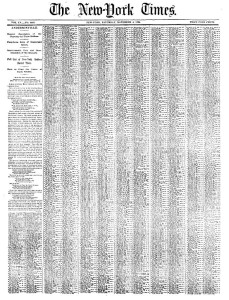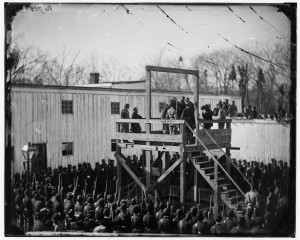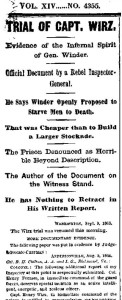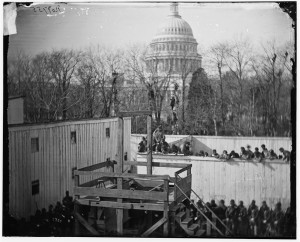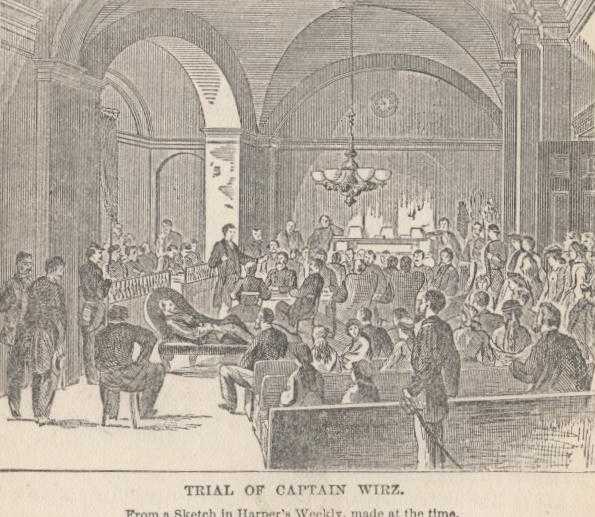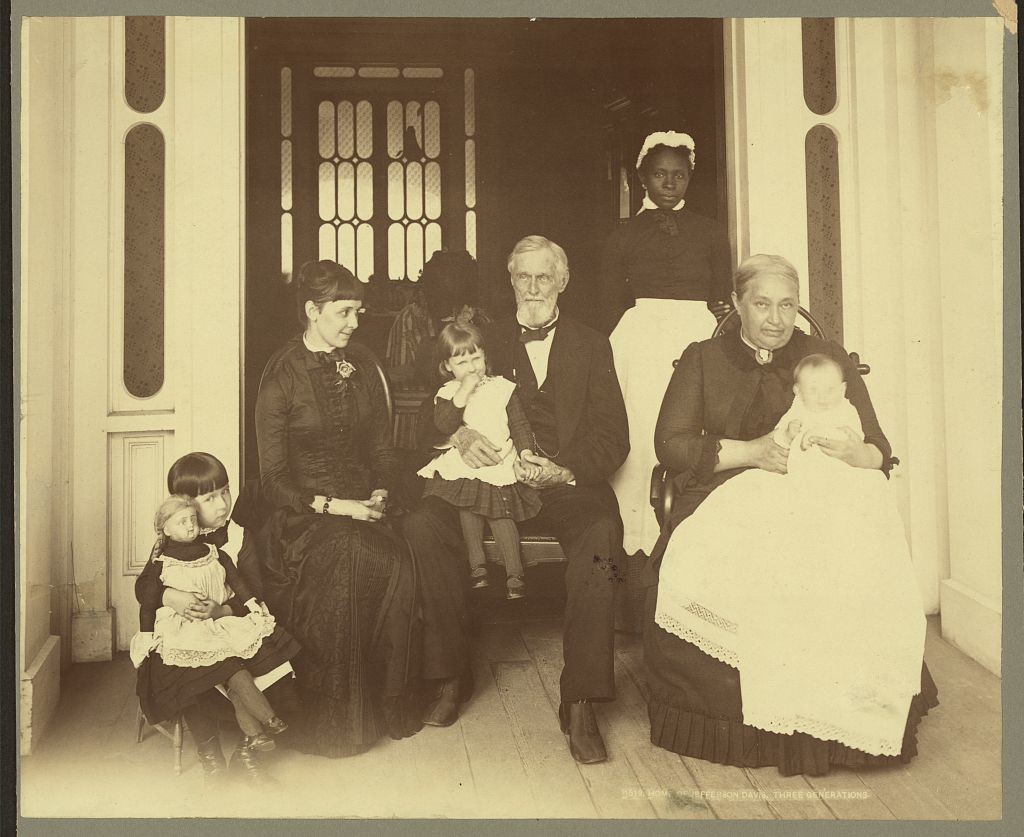From The New-York Times November 11, 1865:
EXECUTION OF WIRZ.; Closing Scenes in the Life of the Andersonville Jailor. Farewell Interview with His Associate, J.H. Winder. Final Effort of His Counsel to Obtain Executive Clemency. Firm Demeanor of the Prisoner on the Scaffold. He Asserts His Innocence to the Last, and Meets His Fate with Fortitude. A Remarkable Attempt to Poison Him Just Brought to Light. A Bolus of Strychnine Conveyed to Him by His Wife.
Special Dispatch to the New-York Times.
WASHINGTON, Friday, Nov. 10.
WIRZ was executed this morning at 10:30 o’clock. Nobody who saw him die to-day will think any the less of him. He disappointed all those who expected to see him quiver at the brink of death. He met his fate, not with bravado, or defiance, but with a quiet, cheerful indifference. Smiles even played upon his countenance until the black coat shut out from his eyes the sunlight and the world forever. His physical misery, whatever it may have been, was completely hidden in his last and successful effort to die bravely and without any exhibition of trepidation or fear, so his step was steady, his demeanor calm, his tongue silent, except as he offered up his last prayer, and all his bearing evinced more of the man than at any time since his first incarceration. The crowd said he was a braver man than PAYNE, or HERROLD, or ATZEROTH. Perhaps it was the bravery of a desperate man, who knows mercy is beyond his hope. Nevertheless, he met his fate with unblanched eye, unmoving feature, and a calm, deliberate prayer for all those whom he has deemed his persecutors. He seemed to have convinced himself of his own innocence, and his last principal conversation was full of protestations that he died unjustly, and that others were just as guilty as he.
Yesterday afternoon, LOUIS SCHADE, WIRZ junior counsel, communicated to him the result of his last appeal to the President. WIRZ said he had no hope. He was ready to die. He had sought and received religious consolation, and it mattered little whether he died now or was spared to die a natural death, for die soon he must. An attache of the Swiss Consulate also called to ascertain the residence of his relatives, that they might be officially apprised of his death. WIRZ said he had been greatly wronged by the refusal of the Swiss Consul to receive money to enable him to conduct his defence.
WIRZ ate his supper as usual, and retiring, slept soundly the best part of the night. This morning he arose early and partook of a moderate breakfast. Soon after, R.B. WINDER, who was associated with WIRZ in the command at Andersonville, was allowed to visit him, and the two had a long conversation, devoted to a review of their career at the stockade, a review of the evidence, and mutual assertions that they were equally guilty, or rather, equally innocent, and that if WIRZ deserved hanging, so did WINDER. WINDER then bade WIRZ an emotional farewell at half-past eight o’clock. Mr. SCHADE was admitted for a farewell interview, during which the prisoner reiterated his thanks for his counsel’s efforts, and expressed himself as to his innocence, much as he had done before. It is due to Mr. SCHADE to say that he has been indefatigable in seeking to prolong the life of his client. He left the prison at the close of the interview, and went to the President’s, where at ten thirty-five he made his last appeal. WIRZ was hung at ten thirty-two.
After Mr. SCHADE left WIRZ, his spiritual advisers, Fathers BOYLE and WIGET entered and remained with him until he was led forth to the scaffold.
The arrangements for the execution which had been under the management of Maj. RUSSELL, Provost-Marshal of the District, and Capt. WALBRIDGE, commandant of the prison, were completed at an early hour this morning. The scaffold was erected in the southern portion of the prison yard. WIRZ is the eighth criminal who has been executed upon it. WOODWARD for the murder of his wife was hung in the jail yard nearly fifteen years ago. SAMUEL POWERS hung in the same place for the murder of young LUTZ, of Baltimore. JOHN CONRAD KESSLER, of Co. K, One Hundred and Third New-York Volunteers, hung in the Old Capitol yard Dec. 5, 1862, for the murder of Lieut. F. LINZY, of the same company, at the Sixth-street wharf. AUGUSTUS FORD, colored, hung on the 3d of March, 1863, in the jail-yard, for the murder of GEORGE ADAMS, colored. CORNELIUS TUELL, hung in the jail-yard on July 6 last, for the murder of his wife. CHARLES FENTON BEAVERS, of MOSBY’s gang, hung in the Old Capitol yard, on Aug. 26, for violating his oath of allegiance he had twice taken. CHARLES WILLIAMS, Thirty-first United States colored troops, Nov. 25, 1864, for the murder of an unknown colored woman at Camp Casey, Virginia, on the 14th of September previous.
The capacity of the yard for holding spectators having been closely estimated, directions were given by Major RUSSELL for the issue of two hundred tickets of admission. He had applications for ten hundred. The hour for the execution not being generally known, people began to assemble as early as 7 o’clock; but no one was admitted to the yard until nearly 10. The crowd who couldn’t get in at all soon became very large, and was chiefly composed of soldiers, many of whom well remembered Andersonville. The facilities for observation for this outside crowd were few — chiefly confined to the tops of a row of shade trees in the capitol grounds, a few house-tops, and the dome of the capitol, a quarter of a mile distant. The house-tops were peopled at an early hour, and favorable places for seeing commanded a premium.
At 10 o’clock, all being ready, Maj. RUSSELL and Capt. WALBRIDGE and the guard entered WIRZ’ room to bring him to the scaffold. WIRZ greeted the officers in a quiet and easy manner. He had been engaged for the previous hour with the confessors, and now complied with the request to prepare for the final scene. Without any exhibition of nervousness, he even indulged in pleasantry as to his appearance in the black shroud, and said also that he “Hoped to have a white gown soon.” The officers proceeded to pinion his arms behind his back, but found the handcuffs would not slip on to his right arm, it being much swollen. His limbs were therefore all left free until he reached the scaffold. As they were leaving the room, WIRZ turned to the mantel, and with as much nonchalance as if he had been in a bar-room, took up a bottle of whisky, and pouring out a liberal draught drank it down with apparent relish. Then taking a chew of tobacco, he took his place in the procession which was led by the Provost-Marshal, then the two Priests, then WIRZ, the guards next, and Capt. WALBRIDGE in the rear, in which order they mounted the scaffold, the prisoner exhibiting much steadiness in his movements. Stepping upon the trap, he seated himself upon a stool, the noose, so soon to be his fatal snare, dangling over his head. Maj. RUSSELL then proceeded to read the order, reciting the finding of the court, and the approval of the sentence by the President,.
The prisoner was charged and convicted of combining, confederating and conspiring with Jefferson Davis, J.A. Seddon, Howell Cobb, John H. Winder, Richard B. Winder, Isaiah White, W.S. Winder, W. Shelby Reed, R.R. Stevenson, S.P. Moore, _____ Kerr, late Hospital Steward at Andersonville; James Duncan, Wesley W. Turner, Benjamin Harris, and others whose names are unknown, and who were then engaged in armed rebellion against the United States, in maliciously, traitorously and in violation of the laws of war, to impair and injure the health and to destroy the lives, by subjecting to torture and great suffering, by confining in unhealthy and unwholesome quarters, by exposing to the inclemency of Winter, and to the dews and burning sun of Summer, by compelling the use of impure water, and by furnishing insufficient and unwholesome food, of large numbers of Federal prisoners, to wit: The number of about 45,000 held as prisoners of war at Andersonville, within the lines of the so-called Confederate States, on or before the 27th of March, 1864, and at divers times between that day and the 10th day of April, 1865, to the end that the armies of the United States might he weakened and impaired, and that the insurgents engaged in armed rebellion against the United States might be aided and comforted, etc., etc.
The order states that the prisoner was found guilty of the second charge, viz.: Murder, in violation of the laws and customs of war, and guilty of all the specifications, excepting the fourth, tenth and thirteenth, which three set forth that he killed a prisoner by shooting him with a revolver; that he ordered a sentinel to fire upon another with a revolver; and that he shot another with a revolver, so that he died.
The order concludes as follows:
Sentence. — And the court do therefore sentence him, HENRY WIRZ, to be hanged by the neck until he be dead, at such time and place as the President of the United States may direct, two-thirds of the members of the court concurring therein.
And the court also find the prisoner, HENRY WIRZ, guilty of having caused the death in the manner as alleged in specification 11, charge 2, by means of dogs, of three prisoners of war in his custody and soldiers of the United States, one occurring on or about the 15th day of May, 1864; another occurring on or about the 11th day of July, 1864; another occurring on or about the 1st day of September, 1864, but which finding as here expressed has not and did not enter into the sentence of the court as before given.
Second — The proceeding, finding and sentence in the foregoing case having been submitted to the President of the United States, the following are his orders:
EXECUTIVE MANSION, Nov. 3, 1865.
The proceedings, finding and sentence of the court in the within case, are approved, and it is ordered that the sentence be carried into execution by the officer commanding the Department of Washington, on Friday, the 10th day of November, 1865, between the hours of 6 o’clock in the morning and 12 o’clock noon.
ANDREW JOHNSON,
President of the United States.
Third-Major-Gen. C.C. AUGUR, commanding the Department of Washington, is commanded to cause the foregoing sentence, in the case of HENRY WIRZ, to be duly executed in accordance with the President’s order.
Fourth — The Military Commission, of which Major-Gen. LEWIS WALLACE, United States Volunteers, is President, is hereby dissolved, by command of the President of the United States.
(Signed) S.D. TOWNSEND, A.A.G.
The reading was finished at 10:20, and WIRZ, was directed to stand up. Major RUSSELL asked him if he had anything to say publicly, to which he replied, “No.” Father BOYLE then recited the service of the Catholic Church for the dying, to which WIRZ responded in a low tone.
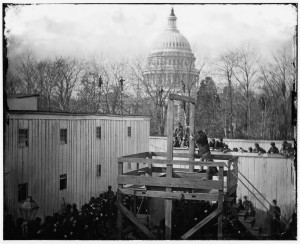
“Washington, D.C. Soldier springing the trap; men in trees and Capitol dome beyond” (Library of Congress)
During these few moments shouts could be heard from the soldiers in the tree-tops of “Hang him,” “Andersonville,” “Remember Andersonville,” and others not calculated to increase his calm demeanor, but he paid no attention to them, and preserved his cheerful expression of countenance throughout.
At thirty minutes past ten, his hands and legs having been pinioned by straps, the noose was adjusted by L.J. RICHARDSON, Military Detective, and the doomed man shook hands with the priests and officers. At exactly thirty-two minutes past ten, SYLVESTER BALLOU, another detective, at the signal of the Provost-Marshal, put his foot upon the fatal spring, the trap fell with a heavy noise, and the Andersonville jailor was dangling in the air. There were a few spasmodic convulsions of the chest, a slight movement of the extremities, and all was over. When it was known in the street that WIRZ was hung, the soldiers sent up a loud ringing cheer, just such as I have heard scores of times on the battle-field after a successful charge. The sufferings at Andersonville were too great to cause the soldiers to do otherwise than rejoice at such a death of such a man.
After hanging fourteen minutes the body was examined by Post-Surgeon FORD, and life pronounced to be extinct. It was then taken down, placed upon a stretcher, and carried to the hospital, where the surgeons took charge of it.
No sooner had the scaffold and the rope done its work, and become historically famous, than relic seekers began their work. Splinters from the scaffold were cut off like kindling wood, and a dozen feet of rope disappeared almost instantly. The interposition of the guard only saved the whole thing from being carried off in this manner.
The surgeons held a post-mortem, and an examination of the neck showed the vertebrae to be dislocated. His right arm, which has been the chief cause of his physical misery, was in a very bad condition, in consequence of an old wound having broken out afresh. His body also showed severe scrofulitic cruptions.
Agreeably to a request from WIRZ, Father BOYLE received the body to-day, and delivered it to an undertaker, who will inter it, to await the arrival of Mrs. WIRZ, who is expected soon. WIRZ left few or no earthly effects. The only things in his room after the execution were a few articles of clothing, some tobacco, a little whisky, a Testament, a copy of Cummings on the Apocalypse, and a cat, which was WIRZ’s pet companion. This is all there is left of him.
Here’s a bit on the Wirz trial from the October 21, 1865 issue of Harper’s Weekly at Son of the South:
THE WIRZ TRIAL.
WE give on this page an illustration of the WIRZ trial going on at Washington, which portrays a more recent phase of the trial than a former engraving printed in the Weekly relating to that subject. As our readers know, Captain WIRZ has during the progress of the trial become quite ill, so that on some days the Commission were under the necessity of adjourning; and when he has been well enough to be present, his indisposition has compelled him to recline on a lounge. “Captain WIRZ,”-says our artist, ” keeps in the position rep-resented in the sketch all day long, excepting when he clutches his bottle of stimulants, or when he is ‘led to his cell by the officer of the guard.”
The case for the prosecution has been closed, and the case for the defense is progressing very slowly indeed. The facts which have been sworn to by the witnesses for the prosecution can not be disputed ; the only question to be settled is one regarding WIRZ’S responsibility for his diabolical acts. In any case, a stain rests upon the military record of the late rebellion which neither tears nor repentance can quite wash out. Andersonville forms an important chapter in the history of the war.
Captain Wirz was “charged and convicted of combining, confederating and conspiring with Jefferson Davis …”, but his co-conspirators got off pretty lightly:
Johnson’s pardon policy also reinforced his emerging image as the white South’s champion. Despite talk of punishing traitors, the President embarked on a course of amazing leniency. No mass arrests followed the collapse of the Confederacy; only Henry Wirz, commandant of Andersonville prison camp, paid the ultimate penalty for treason. Jefferson Davis spent two years in federal prison but was never put on trial and lived to his eighty-second year; his Vice President, Alexander H. Stephens, served a brief imprisonment, returned to Congress in 1873, and died ten years later as governor of Georgia. … [This paragraph goes on to say that President Johnson ignored the Ironclad Oath in making political appointments and began issuing pardons in large numbers by September 1865.[1]
From the Library of Congress: Alexander Gardner was at the Old Capitol Prison: reading, adjusting, springing, hanging; Davis family. The redo of the Harper’s drawing comes from Andersonville by John McElroy.
- [1]Foner, Eric. Reconstruction: America’s Unfinished Revolution, 1863-1877. New York: HarperPerennial, 2014. Updated Edition. Print. page 190.↩

![[Washington, D.C. Reading the death warrant to Wirz on the scaffold] (by Alexander Gardner; LOC: http://www.loc.gov/item/cwp2003001031/PP/)](https://www.bluegrayreview.com/wp-content/uploads/2015/11/04194v-300x244.jpg)
